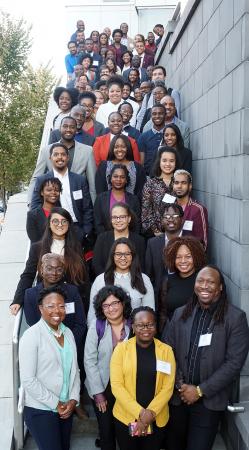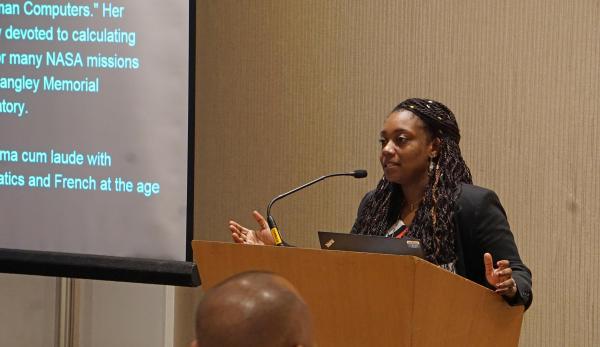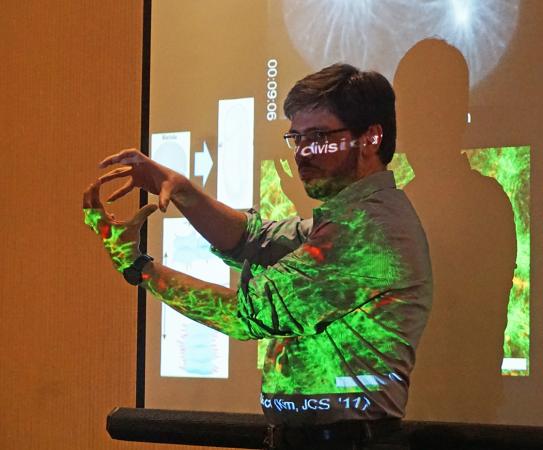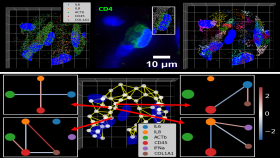Cutting-edge research in topics such as regenerative medicine, DNA synthesis, and genome design and editing took center stage at the first-ever AfroBioTech Conference, which touched down in Atlanta in late October. But there was a constant reminder of the solid foundation on which the research enterprise had been built, shout-outs to African American pioneers of science and engineering.
“The work presented was insightful, of the highest quality, covering the span of biomedical, agricultural, and computational space that falls under the umbrella of biological and chemical engineering,” noted Manu Platt, associate professor in the Wallace H. Coulter Department of Biomedical Engineering at Georgia Tech and Emory University, who co-chaired the conference with event founder and fellow BME faculty member Karmella Haynes.
“I think it was important also that each session was led off with a reflective moment recognizing a scientist or engineer on whose shoulders we stand,” added Platt, a researcher in the Petit Institute of Bioengineering and Bioscience. “People like Charles Drew, Alexa Canady, Louis Sullivan, E.E. Just, James Bowman, Ruth Ella Moore, Katharine Johnson, and Shirley Malcom.”
Haynes created the conference specifically as showcase of under-represented minority (URM) researchers, scientists who “often aren’t seen at other conferences that cover the same technical areas, which I think underscores the ‘invisibility’ and marginalization of African-American scientists,” she said.
She tried to improve URM inclusion at conferences by serving as a committee chair, but often came up against resistance. “So I decided to launch a conference to make URM talent more visible,” said Haynes, who added that several speakers, “devoted a significant part of their presentations to narratives about their experiences as URMs in their fields – the hurdles, discrimination, and their strategies for thriving in spite of these barriers. A common theme was the connection to and appreciation of family, friends, and community.”
The invited speakers included Stefan France, associate professor in the School of Chemistry and Biochemistry at Georgia Tech and a Petit Institute member, as well as researchers from across the country, representing academic institutions, industry, and government agencies.
A critical but unplanned outcome of the three-day conference (Oct. 27-29 at Hyatt Centric Midtown Atlanta) was the mentoring and networking that took place between sessions. “Many of the presenters are the ‘only’ at their institutions or in their graduate programs, so they took the time to get to know others who were steps ahead of them in their careers, to get guidance on what success looks like,” said Platt.
For a group of students from Project ENGAGES, the minority high school program based at Georgia Tech in the Petit Institute, this was an opportunity to share their work and hang out with older minority researchers.
Ultimately, success of the event was represented by the numbers. Haynes was expecting 50 attendees. There were nearly 100. AfroBiotech, a conference of the American Institute of Chemical Engineers (AIChE), will return to Atlanta in the fall of 2020. Lead sponsor Thermo Fisher has already pledged to support the event next year. Other sponsors included Ginko Bioworks, the Coulter Department, and the Regenerative Engineering Society.
Media Contact
Jerry Grillo
Communications Officer II
Parker H. Petit Institute for
Bioengineering and Bioscience
Keywords
Latest BME News
Commercialization program in Coulter BME announces project teams who will receive support to get their research to market.
Courses in the Wallace H. Coulter Department of Biomedical Engineering are being reformatted to incorporate AI and machine learning so students are prepared for a data-driven biotech sector.
Influenced by her mother's journey in engineering, Sriya Surapaneni hopes to inspire other young women in the field.
Coulter BME Professor Earns Tenure, Eyes Future of Innovation in Health and Medicine
The grant will fund the development of cutting-edge technology that could detect colorectal cancer through a simple breath test
The surgical support device landed Coulter BME its 4th consecutive win for the College of Engineering competition.
New research from Georgia Tech helps doctors predict how therapies will interact with a child's immune system, potentially improving outcomes and reducing risks.










